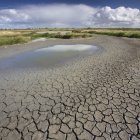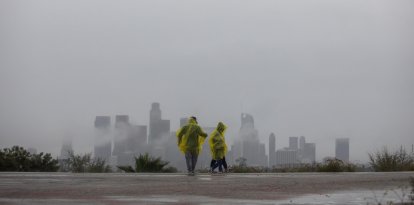CLIMATE HOAX: Reefs, global warming and polar bears: Three lies spread by climate alarmists
Recent data presents a stark contrast to the alarmist predictions of the past two decades, painting a picture far removed from the catastrophic scenarios anticipated by activists.

Greta Thunberg became a standard bearer for climate activism/ Jonathan Nackstrand.
Over the past few decades, climate alarmists have made it their mission to scare the world's population with a series of chilling predictions. These range from doomsday scenarios to warnings of rising deaths due to extreme heat and the possible extinction of the iconic polar bear, a sybmol frequently featured in videos and exhibitions worldwide.
However, it turns out that the predictions were somewhat exaggerated, some would even say inaccurate. In recent months, new revelations backed by hard data have emerged, offering a clearer perspective on the often grim narrative about climate reality.
Specifically, it's about extreme heat, the extent of coral reefs and, of course, the survival of the beloved polar bear.

Society
Climate hoax: News reports of the ‘hottest day in history’ may be biased and misleading
Williams Perdomo

The call to action against "extreme heat"
Just a few months ago, President Joe Biden stated that "extreme heat is the leading cause of climate-related death in the United States."
He was recently joined by the World Health Organization (WHO), announcing that more than 175,000 people die each year from "extreme heat" in Europe alone. UNICEF, the United Nations child welfare organization, reported that around 377 young people died in 2021 from high temperatures in Europe and Central Asia.
Bjorn Lomborg, chairman of Copenhagen Consensus and author of books such as 'False Alarm', first corrected President Biden, claiming that extreme heat kills 6,000 Americans per year, while cold temperatures kill 152,000, 12,000 of them dying from extreme cold.
"Despite rising temperatures, age-standardized extreme heat deaths have actually declined in the U.S. by nearly 10% in a decade and globally by even more, largely because the world is becoming more affluent. That allows more people to afford air conditioners and other technology that protects them from the heat," he explained in an article published in The Wall Street Journal.
In a separate write-up, the author spoke out against the WHO data, warning that the figure is "four times exaggerated."
"Questioned, the WHO quietly amended its statement online by removing the word "extreme" from the title, but only after the media had already spread the catastrophic news. Although they corrected the error online, they didn't find the space to mention that extreme heat is actually the lowest temperature-related risk in Europe, and cold kills 13 times as many people," Lomborg clarified.
Accoring to UNICEF's own data, the Institute for Health Metrics and Evaluation's "Global Burden of Disease" statistics, the data actually shows that annual heat-related deaths among young people have decreased by more than 50% over the past three decades.
">The polar bear used to be the emblem of climate apocalypse.
— Bjorn Lomborg (@BjornLomborg) October 4, 2024
And then in the 2010s, campaigners just stopped talking about them.
Why? It finally became impossible to ignore that the global polar bear population has increased substantially.https://t.co/SWDIPMEnBz
Lomborg also added that cold temperatures cause about three times as many child deaths in these regions each year. "The brief also neglected to mention that heat is one of the least significant causes of death for young people. Malnutrition claims 26,000 young lives across Europe and Central Asia every year. In a world of limited resources, you’d think that would be UNICEF's priority," the author added.
Lomborg also spoke with Antonio Guterres, Secretary General of the United Nations, who recently warned of "a rapid increase in the scale, intensity, frequency and duration of extreme heat events."
Lomborg explained that, over the past 30 years, the global annual average of heat wave days has increased from 13.4 to 13.7, which does not suggest an increase worthy of outrage. At the same time, he indicated that "high temperatures are mostly the result of seasonal changes that have existed for a long time," so he found it likely that "only one third of an annual heat wave day is attributable to climate change over the past three decades."
Deaths from moderate heat total 334,000 annually, while cold temperatures claim 4.5 million lives each year. "Most important, even though the planet is warming, that groundbreaking 2024 study found that the global death rate from extreme heat has declined by more than 7% a decade over the past 30 years," Lomborg said.
The 'rebirth' of polar bears
"What happened to the polar bears?" Lomborg asked, recalling how activists have warned of their extinction for decades, repeatedly depicting them stranded on thin sheets of ice on the verge of melting away.
He specifically referenced Al Gore's documentary, An Inconvenient Truth, as well as a 2004 warning from The Washington Post warning that the species could face extinction. The World Wildlife Fund also predicted that certain polar bear populations would be unable to reproduce beyond 2012.
"After years of misrepresentation, it finally became impossible to ignore the mountain of evidence showing that the global polar-bear population has increased substantially," he wrote, arguing that a key factor in the survival of this species was reduced hunting.
When it came to numbers, he noted that the polar bear population has grown from 12,000 in 1960 to an estimated 26,000 today.
From the "great reef catastrophe" to record numbers in 2024
Finally, Lomborg brought up Australia's Great Barrier Reef, which stretches for some 1,600 miles, making it the largest coral reef in the world. It is considered to be the world's largest animal and has one of the highest concentrations of biodiversity on the planet.
For the past ten years, there has been speculation about a "great catastrophe" befalliung the reef, with The Guardian even going so far as to publish an obituary in 2014. These predictions suggested that rising sea temperatures would cause the reef to shrink by 5% to 10% by 2022. By 2024, however, the reef has reached record growth, exceeding 30%.
"Today, the Great Barrier Reef is better than ever. But 12 years ago, we were told about the "Great Reef Catastrophe" and how the reef would be almost gone today. Moral of the story: Don't always believe the scare stories," Lomborg posted on social media.

























